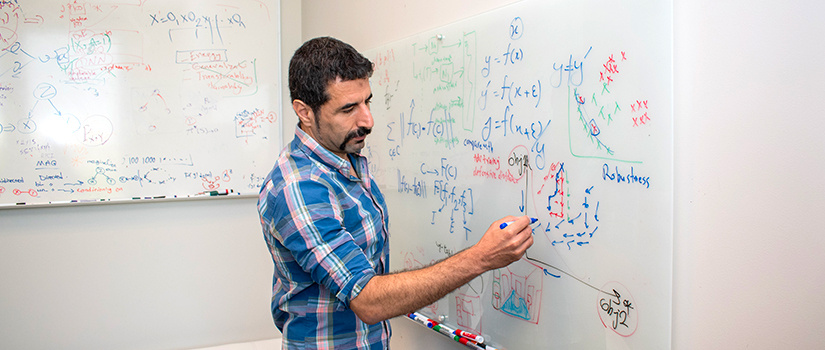By Abe Danaher | June 21, 2019
The first year at any job is hard. New cities, new people, new responsibilities – the weight of “new” can be awfully overbearing. But for Pooyan Jamshidi, one of the newest faculty hires in the College of Engineering and Computing, the first year at the University of South Carolina wasn’t hard. Instead, it was just different.
“Overall, I think it went according to the plan,” says Jamshidi, whose one-year anniversary at South Carolina will be in August.
While his previous two years were spent researching artificial intelligence and machine learning as a postdoctoral associate at Carnegie Mellon University, this past year at South Carolina was mostly devoted to preparing courses based on his research interests.
First, he developed a machine learning systems course entirely from scratch. Then, he completely redesigned the college’s CSCE 580 artificial intelligence course, evolving it from a logic-based class to a project-based, multi-dimensional course discussing current artificial intelligence topics such as statistical learning, reinforcement learning and neural networks.
In the artificial intelligence course, he also placed a heavy emphasis on the ethics surrounding this technology. In the near future, Jamshidi predicts that artificial general intelligence will be built, creating a machine capable of making any human decision. This, paired with the exponentially increasing infiltration of AI into nearly every sector of the world economy, has made ethics the “most important thing” for students to consider. To force them to do so, he required every student in the class to write an essay explaining their thoughts on the ethical dilemmas surrounding AI.
Developing these courses took a lot of time, but in the end, he felt it was worth it.
“Students liked it a lot,” Jamshidi says regarding the redesigned artificial intelligence course. “These changes are the kind of things that make students more excited about the topic.”
Marilyn Garney, an attorney in Columbia who took Jamshidi’s redesigned AI course, was amazed by his ability to connect to his students and make complicated material easy to understand. She feels that Jamshidi has a “unique gift” that allows him to inspire students from all backgrounds and interests.
For Elizabeth Stewart, a doctoral student who also took the course, there was one moment during the semester that she felt perfectly personified his care for his students. She says, “He came in on a Saturday to teach an extra credit session after the final exam session was over. He didn’t have to be there; we didn’t have to be there. It was really awesome.”
This same care was felt by the doctoral students working in his lab. “He always gives us feedback and helps us with what to do,” says Shahriar Iqbal, a second-year doctoral student researching the optimal configuration of artificial intelligence in Jamshidi’s lab. “And the best part is that whenever we are starting something, he always has some bigger plan.”
Now, after a first year that saw Jamshidi recieve a grant from DARPA/DoD/CMU, an ASPIRE Award and a NASA EPSCoR research award, he has begun setting goals for his second year at the university. He is excited to have more time to devote to his research and to see how his classes and expertise can help advance the university’s newly-announced Artificial Intelligence Institute.
He is also excited by the positive impact he thinks artificial intelligence can have on disciplines across campus. After brief conversations with faculty in other disciplines, he thinks that many problems across a variety of fields can be solved by machine learning and AI. This belief has been furthered by his recent collaboration with the chemical engineering department, where he is using artificial intelligence to help them efficiently develop new materials for their research using transfer learning.
It has led him to dream about the possible impact of his research, not just at South Carolina, but across the world.
“This process, potentially, could lead to AI winning the Nobel prize,” he says. “If you are able to get the AI algorithm to discover new materials, then why not? In the future, maybe a robot will win the Nobel prize!”
